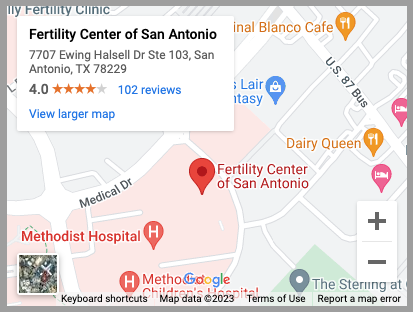FEMALE FERTILITY TESTING – SAN ANTONIO, TX
The Fertility Center of San Antonio is well-equipped to help women and men who experience issues with fertility. In order to best meet the needs of patients, it’s important that a fertility evaluation be performed to assess the cause(s) of infertility. This applies to both men and women who’ve had trouble conceiving naturally.
Let’s take a moment to focus on female infertility and the kinds of tests that may be performed.
How Common Is Female Infertility?
Female infertility accounts for roughly 33 percent of all cases of infertility seen by fertility doctors. The distribution is actually quite even: male infertility accounts for another 33 percent of infertility cases, and a combination of male and female infertility factors accounts for the remaining 33 percent.
Common Causes of Female Infertility
Some common causes of female infertility include:
- Polycystic ovarian syndrome (PCOS)
- Blocked fallopian tubes
- Issues with egg quality or quantity (low ovarian reserve)
- Endometriosis
- Issues with hormone levels
- Uterine abnormalities
- Advanced age (i.e., older than 35)
There are also instances in which the exact cause of female infertility is unidentifiable, so keep that in mind.
Fertility Testing Gives Doctors Better Insight Before Determing Treatments
Infertility testing fertility specialists the insight they need when it comes to finding the exact cause of infertility. Once this has been identified, the ideal treatment option or options will be easier to determine. There are multiple tests that can be performed, allowing fertility doctors to really narrow down causes of problems and act accordingly.
Tests That May Be Performed
Some female infertility tests that may be performed are as follows:
- Ovulation Tests – This involves a combination of an over-the-counter ovulation prediction kits as well as clinical blood work to determine if ovulation problems are the reason for your infertility.
- Ovarian Reserve Tests – The ovarian reserve is the amount of viable eggs in a woman’s ovaries. These tests assess the viability and health of the eggs.
- Hysterosalpingography – A type of x-ray, this allows fertility doctors to note any potential problems or abnormalities with the fallopian tubes and uterus.
- Hormone Tests – Hormones are a major factor in fertility, which is why fertility specialists will perform various blood tests to identify any imbalances in hormone levels.
- Medical Imaging Tests – In addition to a hysterosalpingography, the use of ultrasound and other imaging tests is common to the uterus and fallopian tubes.
- Laparoscopy – A more invasive imaging test, this is a minor surgery performed to insert a small, thin camera into the pelvic region. This allows fertility doctors to get a better look at the different parts of the female reproductive system.
- Genetic Testing – A number of genetic factors can lead to female infertility, which is why genetic tests are a good option to consider.
Determining the Ideal Fertility Treatment for You
Once the test results have been properly analyzed, fertility doctors can then determine the ideal treatments to perform to help address female infertility issues. Sometimes it may involve medications and lifestyle modifications to improve hormone levels, while in other cases more advanced procedures such as in vitro fertilization (IVF) may be involved.
Contact the Fertility Center of San Antonio
If you would like to learn more about testing infertility and which treatments might be most ideal for you, be sure to contact the Fertility Center of San Antonio today. Our entire team looks forward to your visit and helping you have the family that you have always wanted.










